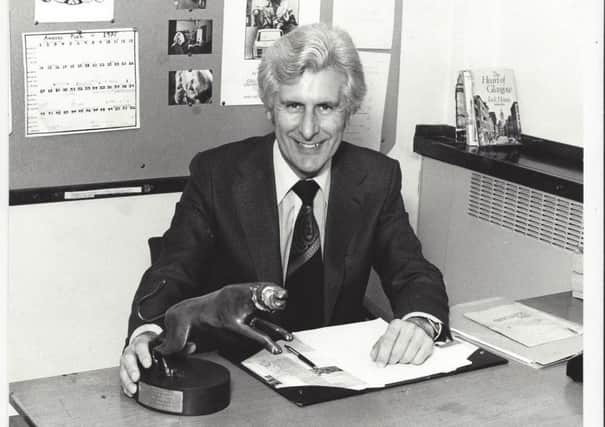Obituary: James Allan Wilson, journalist, radio, TV and film critic, documentary film-maker and author


The young pupil at George Watson’s Boys’ college, Edinburgh in the 1920s with prospects of a secure Civil Service career could never have dreamed he’d become this newspaper’s first TV critic then go on to become an internationally known documentary film maker producing some 30 films, working with Fred Zinnemann and corresponding with Alfred Hitchcock.
Yet, despite huge acclaim for his pioneering work in what he once called “a cottage industry” James Allan Wilson, who died on 19 January 19, remained a modest individual, though he’d been responsible for extensive radio and TV output on Scotland’s story in the last century, recording its industries and interviewing leading personalities from many walks of life. His collection of work will provide a unique archive for researchers seeking a window to look back through to the life, culture and character of the nation at that time.
Advertisement
Hide AdAdvertisement
Hide AdWe used to meet occasionally in the Royal Overseas League, Princes Street where some of his former colleagues from newspapers and broadcasting would gather to share memories of their early days – sometimes embellished in the telling – but Jim always sat quietly, listening and responding when needed, though he himself had many a tale he might have told, from his outstanding career, yet few of us if any, heard the details.
Born and educated in Edinburgh, Wilson studied at the city’s Skerry’s Commercial College, gaining the Royal Society of Arts certificate in Pitman’s shorthand and typewriting and passing Edinburgh University’s entrance/prelim in 1939. He was recruited by The Scotsman as an ‘editorial assistant’ whose duties included being telephone clerk and editor’s secretary. After being trained by the paper as a reporter and sub editor Jim served with HM Forces – Royal Corps of Signals – from 1942-1946 in India, Burma, Malay and Java, gaining the rank of Sergeant.
On return to The Scotsman in 1946, he was made a senior reporter and sub editor, specialising in stage, screen and radio and becoming the newspaper’s first film critic, a year later branching out into the Edinburgh Film Guild council, which organised the Edinburgh International Film Festival. Appointments to several Guild posts followed and Jim chaired a series of lectures on documentary film at the 1948 Festival. For the North American service of the BBC, he wrote and delivered a review of Canadian films at the Edinburgh Festival in September 1951. That year, he was appointed The Scotsman’s radio critic and the newspaper’s first TV critic the following year. He was the principal contributor to a special supplement: “TV comes to Scotland” in the same year.
As film critic, he was able to meet and interview some leading players, like Orson Welles, when they visited the Festival.
Much sought after because of his experience, Jim Wilson was a regular contributor to specialist publications here and in the US, including Penguin books’ Film review and (1953) the Scottish Federation of Film Society’s Film Forum which carried contributions from him on Television, Film and Reality.
His work gradually evolved from print journalism and he joined BBC Glasgow in 1955.
The family moved to Aberdeen (1959-1968) where he was the Corporation’s producer. They moved back to Glasgow where Jim became a documentary film producer, holding that post until 1978. Then it was back to Edinburgh where he was appointed Director, Films of Scotland.
Jim made three specially notable programmes in the 1960s for the Home Service: Scottish Life and Letters covering theatre; poetry (Norman MacCaig) with Ian Cuthbertson narrating. Sir Compton Mackenzie also speaks in one about his meeting with Lloyd Osbourne, Robert Louis Stevenson’s adopted son.
Advertisement
Hide AdAdvertisement
Hide AdHis preference, however, was not for studio set-ups, but on-location assignments using new(er) technology and lighter equipment at remote spots – to capture hard lives lived in difficult conditions and record the nation’s newly developing industries like North Sea Oil as well as highlighting changes in culture and society. He could think of a subject, plan how it should be treated, control the budget and present it to the BBC for approval, using a crew of only four or five.
His work often involved the famous names of that era: Fulton Mackay; Sir Compton Mackenzie; Leonard Maguire; Hugh MacDiarmid – The Rebel Poet – and John Grierson (father of the documentary) The Name Grierson – The Word, Documentary which was broadcast on BBC 1 in 1973.
He even tried to involve Alfred Hitchcock – seen from a distance, on a shooting set in Hollywood – in a joint venture on the work of Scots novelist John Buchan. Sadly, the master never followed through – though he did invite Jim and his crew to watch a night shoot of his latest production.
Jim also wrote two novels: Interrupted Journey (1958) and Straw in the Wind (1960) and moved to composing poetry in his final years.
In 2015, Wilson was awarded honorary membership of the Saltire Society for his contribution to documentary film making.
Husband of the late Jean (née Whitehead), Jim is survived by his sons Allan and Andrew, grandchildren Jamie, James and Scott, and great-grandchildren Archie and Annabelle.
Brian McGuire